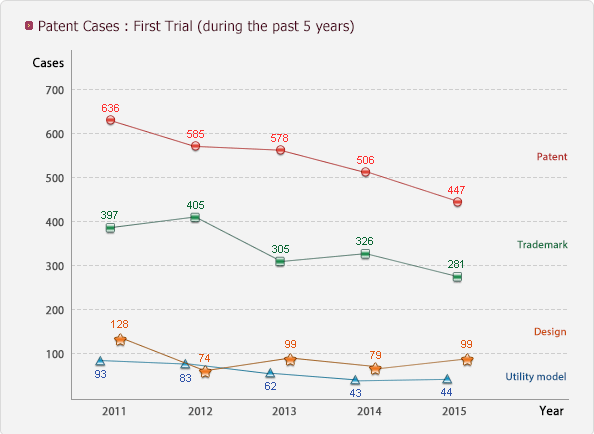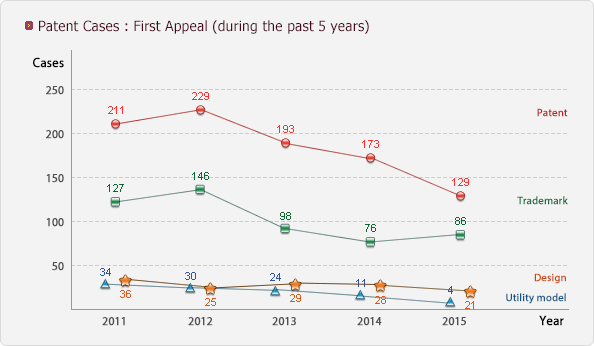Patent
In patent cases, the court decides on whether the decision of the Intellectual Property Tribunal (IPT) on the rights of patent, utility model, design, or trademark is illegal and should be revoked. The IPT makes decisions on legality of refusal to accept an application for patent registration, on invalidation of patent registration, and on affirmation of the scope of a patent right. The party who is dissatisfied with the decision of the IPT may file a suit seeking to revoke the decision with the Patent Court within 30 days from the date the decision is served. When decision on legality of refusal is challenged, the defendant of a suit shall be the Commissioner of the Korean Intellectual Property Office. When decision on invalidation of patent registration or decision on affirmation of the scope of a patent right is challenged, the defendant of a suit shall be the opposite party in the decision process. On the principle of separation of powers, the Patent Court can only revoke the decision of the IPT and neither permits patent registration of any invention nor invalidate a patent right.

In Korea, the Patent Court exercises exclusive jurisdiction over patent issues. Under the three-tier system, the Patent Court is situated on the High Court level and has territorial jurisdiction over the entire nation. At the Patent Court, a panel of three judges hears cases. The pleading process and hearings are held as in civil proceedings. As a patent case is a kind of administrative case, the court may examine evidence ex officio if it is deemed necessary.
In addition to lawyers, patent attorneys are also permitted to represent the parties in the proceedings at the Patent Court. When the case relates to patent rights or utility model rights, the court normally holds pre-trial hearings where the parties, or their attorneys, are granted the opportunity to fully state their positions and to produce evidence. The Patent Court has technical examiners to assist judges in highly technical matters. They have degrees in various fields such as chemistry, mechanics, metal engineering, life science, electrical engineering, electronics, etc. They may participate in pre-trial and trial proceedings with the presiding judge's approval. To precisely understand the technical aspects of patent- or utility model-related disputes, the Patent Court may hold explanatory sessions where parties or relevant experts can make presentations using drawings, real objects, models, computer graphics, or video devices.
When the case relates to design rights or trademark rights, the court does not hold pre-trial hearings because the issues have become evident during IPT decision process. A party who is dissatisfied with the judgment of the Patent Court may appeal to the Supreme Court.
The Patent Court is seeking to introduce an electronic filing system which enables submission, acceptance, and service of documents through electronic devices and a modernized courtroom equipped with high-tech multimedia facilities such as computers, electronic boards, voice recognition cameras, LCD projectors, etc. and a teleconferencing trial system. This kind of move is expected to ease the inconvenience caused by logistical problems, which are inevitable when one court exercises territorial jurisdiction over the entire nation as well as to contribute to establishment of a paper-free court.

| Year | 2011 | 2012 | 2013 | 2014 | 2015 |
|---|---|---|---|---|---|
| Patent | 636 | 585 | 578 | 506 | 447 |
| Trademark | 397 | 405 | 305 | 326 | 281 |
| Utility model | 93 | 83 | 62 | 43 | 44 |
| Design | 128 | 74 | 99 | 79 | 99 |

| Year | 2011 | 2012 | 2013 | 2014 | 2015 |
|---|---|---|---|---|---|
| Patent | 211 | 229 | 193 | 173 | 129 |
| Trademark | 127 | 146 | 98 | 76 | 86 |
| Utility model | 34 | 30 | 24 | 11 | 4 |
| Design | 36 | 25 | 29 | 28 | 21 |



